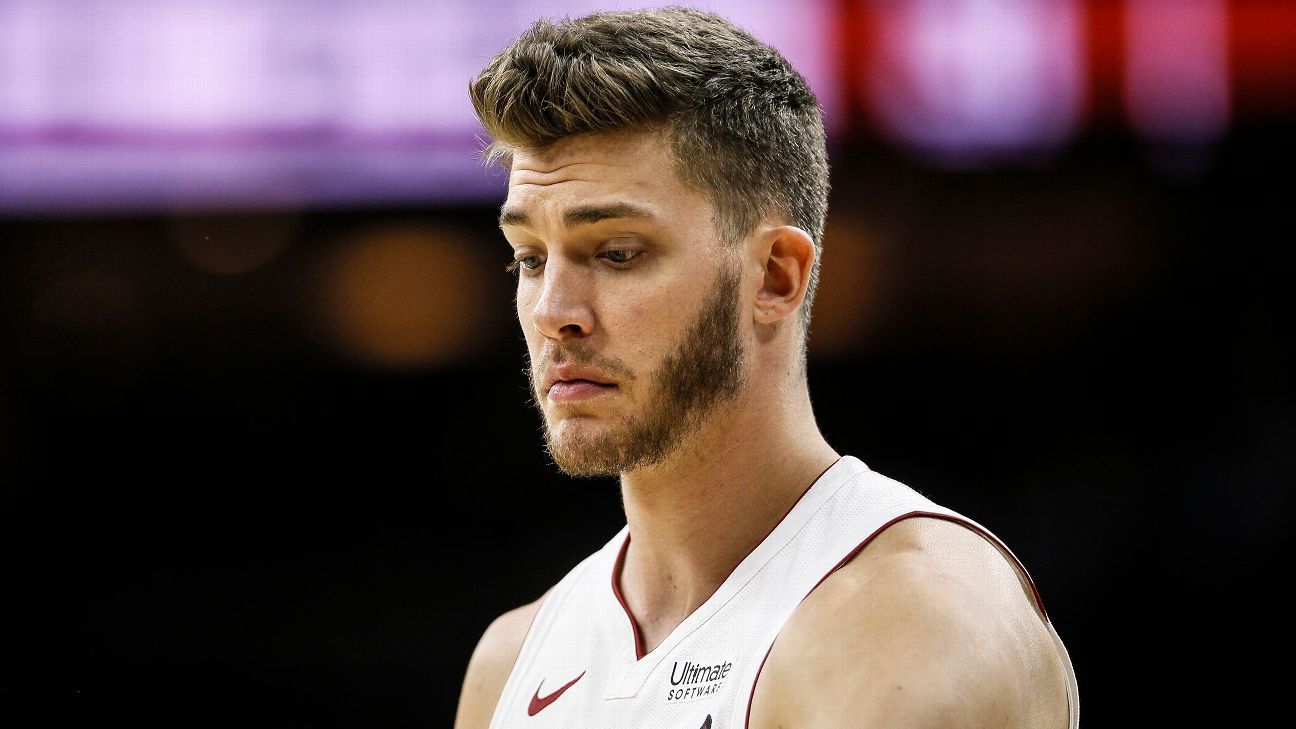Meyers Leonard, a former first-round NBA draft pick who hasn’t played in the league since 2021 after using an antisemitic slur during a video game livestream, told ESPN there are “no excuses” for what he did, but that he expects to play in the NBA again.
“I feel like I’m living in a bad dream,” Leonard told Jeremy Schaap of “Outside the Lines” in an interview that aired Tuesday. “… There’s not a hateful cell in my body. And I know that I made a huge, huge mistake.”
Leonard last played in the NBA in January 2021. He was suspended in March 2021 for using an antisemitic slur while playing a video game during a livestream. He underwent ankle surgery in April 2021 and said he suffered nerve damage as a result of the procedure.
He spent time rehabbing shoulder and ankle surgeries over the past two seasons while out of professional basketball.
Leonard has played in 447 NBA games, averaging 5.6 points and 3.9 rebounds. He also gained notoriety for standing while his teammates knelt to bring attention to the issue of police brutality during the playing of the national anthem in the Orlando bubble during the COVID-19-delayed 2019-20 season.
He later said in a piece for ESPN’s Andscape that he supported the military (his brother served in Afghanistan) as well as “feeling pain in my heart” for people of color after the murder of George Floyd and shooting of Jacob Blake in 2020.
Now 30, Leonard recently worked out for the Los Angeles Lakers.
Leonard told Schaap that he did not know the history or meaning of the antisemitic slur he used, but said “there’s less than ideal language used in a large portion of video gaming.”
He added: “There are absolutely no excuses for what happened that day. And ignorance, sadly, is a very real thing … I am not running from this, but I did not know that it happened.”
According to the Anti-Defamation League, antisemitic incidents reached an all-time high of 2,717 in the U.S. in 2021 — an average of more than seven incidents per day and a 34% increase year over year. It’s the highest number on record since the ADL began tracking antisemitic incidents in 1979.
After his slur was made public, Leonard apologized on Instagram and was suspended by the NBA for a week. He was also fined $50,000. The week after the incident, Miami traded him to Oklahoma City, which subsequently released him.
“I felt like I had just destroyed my life and everything that I worked for, to be honest,” he told Schaap. “… People had every right to, I suppose, make assumptions about me. People were going to have to, in the media, comment on this. And I understand, I do.
“I said, you better go handle this and to show people what’s in your heart.”
He added: “I thought that it’d be easier to be dead than it would be to deal with what had just happened, because I want everyone to like me. I don’t hate anybody. I would never intentionally hurt anybody.”
Leonard was asked about Kyrie Irving, who tweeted and posted an Instagram story that included a link to a 2018 film on Amazon that has been described as containing antisemitic disinformation.
“I can only speak for myself and what I would say is that antisemitism is very real and more people do need to be educated and understand everything … about the history of what’s gone on,” he said.
Leonard added: “Even more importantly, if you do make a mistake or if you do say something that maybe you didn’t intend to hurt somebody, but then you’re trying to explain it, it is just simply best, in my opinion, to say sorry and heal what has ever happened.”
Said NBA spokesman Mike Bass: “Since his use of a derogatory and unacceptable term in 2021, Meyers Leonard has been held accountable and has dedicated considerable time and effort to understand the impact of his comment. He has met with numerous leaders in the Jewish community and participated in community programs to educate himself and use his platform to share his learnings with others.”
Specifically, Leonard notes that he has sought counseling from two rabbis in South Florida. He also said he has met frequently with Jewish organizations and has learned more about antisemitism.
But he also understands he’ll be known for what he did and will have to deal with that if he returns to an NBA court.
“I’ll be a little scared of what someone might say to me, what a fan might say,” he told Schaap. “But I always come back to this: Don’t give up. If you’re a good person and you work hard, things are going to work out in life. And I wholeheartedly believe that.”
